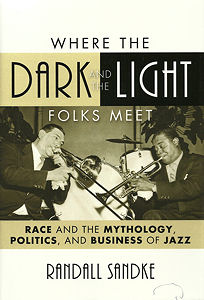Randall Sandke is better known as Randy Sandke, a very talented trumpeter
who I have heard and admired at several Blackpool Jazz Parties in
recent years. This book sets out to disprove some widespread myths
about jazz, many of which might be summed up in such misguided generalizations
as "Black people have a natural sense of rhythm" and "White
men can't play the blues".
Statements or assumptions like this draw an artificial boundary between
black and white musicians and pretend that jazz was not only invented
by African-Americans but that only they can play really good or authentic
jazz. Sandke dismantles such myths with careful research, although
one might have thought that, by now, there should be no need to show
these ideas for the fictions they really are.
In fact they are still regrettably alive - even in academia. For
example, a research project at the Open University has recently been
given half a million pounds for a "Black British Jazz" project
whose leader (A. J. Toynbee) has made such blinkered, even offensive,
remarks as "If the British are now capable not only of tapping
their feet in time, but of understanding the complexities of groove
it is in no small part due to black jazz musicians who have shown
that a sense of rhythm, far from being natural, is an extraordinary
accomplishment".
Combating such myths has proved controversial in the past - for example,
when Dick Sudhalter drew attention in his book Lost Chords
to the contribution of white musicians to the development of jazz.
Randy Sandke makes only one passing reference to Sudhalter, noting
rather dismissively that his book only covered white jazz musicians
from 1915 onwards.
At any rate, Sandke opens by stating two competing views of jazz
history: "Does jazz represent the expression of a distinct and
independent African-American culture...or is it more properly understood
as the juncture of a wide variety of influences under the broader
umbrella of American and indeed world culture?"
Randy calls these two two views "exclusionary" and "inclusionary",
and comes down firmly on the side of the latter. He produces convincing
evidence - such as the collaboration and mutual admiration that existed
between musicians of all colours from the earliest days of jazz. The
front cover picture on the dust jacket shows Jack Teagarden and Louis
Armstrong working together harmoniously in Louis' All Stars - a relationship
whose warmth comes through in their classic duet on Rockin' Chair.
And Sandke quotes several occasions when Louis praised white cornettist
Bix Beiderbecke.
Sandke questions the belief that jazz came exclusively from Africa
and rightly points out the influences from European music on such
seminal forms as ragtime (although he seems unaware of Louis Gottschalk,
a virtuoso classical pianist who wrote works in the mid-19th century
foreshadowing ragtime).
So far, so good. However, about halfway through the book, Randy Sandke
suddenly launches an attack on fellow-trumpeter Wynton Marsalis, singling
him out for supposedly being "a new black messiah". Randy
undermines his own case by admitting: "It seems almost unfair
to hold Marsalis personally responsible for assuming the exalted position
that society so eagerly conferred upon him". Yet Sandke accuses
Marsalis of such wickedness as excluding white musicians from the
Lincoln Jazz Center. He doesn't explain how one person could be so
influential even with the massive publicity he received from his record
company. Other African-Americans (such as Miles Davis and John Coltrane)
had earlier been accorded similar acclaim. And if Marsalis is such
an evil influence, why does Sandke's website say that Randy has written
transcriptions for Wynton Marsalis and the Lincoln Center Jazz Orchestra?
Wynton Marsalis was an individual who recorded classical European
concertos as well as jazz, and he was widely criticised for his criticisms
of developments like avant-garde jazz and his praise for classic jazz
and the jazz "tradition". Randy Sandke forgets to mention
that he himself has made many recordings and played at many concerts
containing just such classic jazz. One cannot resist feeling that
this is a nasty case of sour grapes, accentuated by Sandke's references
to the neglect accorded to his invention of "metatonal"
jazz. Having heard examples of it, I can well understand why it hasn't
endeared itself to millions, because it is a concept which is very
hard to grasp, and can sound as unwelcoming as some of the excesses
of the avant-garde.
After such obvious subjective bias, I read the remainder of the book
with much less enthusiasm and more scepticism. And in chapters discussing
how both black and white musicians were exploited by the likes of
agents, record producers and club owners, Sandke seems almost unaware
of the discrimination against African-Americans which was a fact of
life in the USA for so many years - and possibly still is. I agree
with his opinion that there is no such thing as a "pure race",
because we all come from mixed-up backgrounds, but it was still a
fact that in America that, if you were considered "black",
that was a pretext for discrimination.
Sandke's book raises many interesting questions about jazz, but his
arguments are often thrown into doubt by the hints of personal prejudice.
Yet he makes the point that some writers still fail to grasp: that
a jazz musician's ability has nothing to do with colour or race (if,
indeed, such things can be considered definite characteristics) but
by his or her musical skill and what he or she manages to do with
it. What they say in their music is much more important than
how they look.
Tony Augarde
www.augardebooks.co.uk
